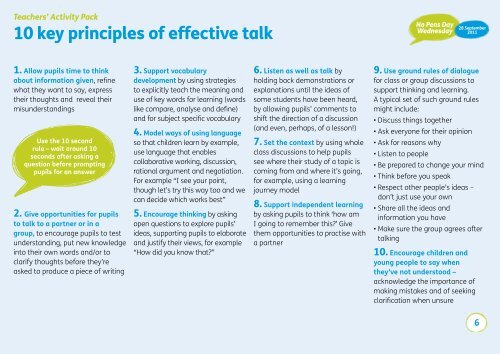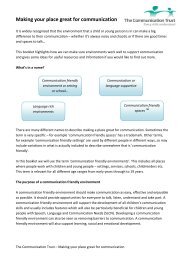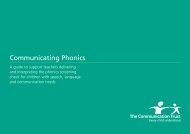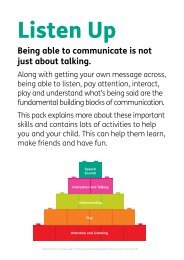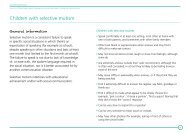No Pens Day Wednesday - The Communication Trust
No Pens Day Wednesday - The Communication Trust
No Pens Day Wednesday - The Communication Trust
Create successful ePaper yourself
Turn your PDF publications into a flip-book with our unique Google optimized e-Paper software.
Teachers’ Activity Pack<br />
10 key principles of effective talk<br />
<strong>No</strong> <strong>Pens</strong> <strong>Day</strong><br />
<strong>Wednesday</strong><br />
28 September<br />
2011<br />
1. Allow pupils time to think<br />
about information given, refine<br />
what they want to say, express<br />
their thoughts and reveal their<br />
misunderstandings<br />
Use the 10 second<br />
rule – wait around 10<br />
seconds after asking a<br />
question before prompting<br />
pupils for an answer<br />
2. Give opportunities for pupils<br />
to talk to a partner or in a<br />
group, to encourage pupils to test<br />
understanding, put new knowledge<br />
into their own words and/or to<br />
clarify thoughts before they’re<br />
asked to produce a piece of writing<br />
3. Support vocabulary<br />
development by using strategies<br />
to explicitly teach the meaning and<br />
use of key words for learning (words<br />
like compare, analyse and define)<br />
and for subject specific vocabulary<br />
4. Model ways of using language<br />
so that children learn by example,<br />
use language that enables<br />
collaborative working, discussion,<br />
rational argument and negotiation.<br />
For example “I see your point,<br />
though let’s try this way too and we<br />
can decide which works best”<br />
5. Encourage thinking by asking<br />
open questions to explore pupils’<br />
ideas, supporting pupils to elaborate<br />
and justify their views, for example<br />
“How did you know that?”<br />
6. Listen as well as talk by<br />
holding back demonstrations or<br />
explanations until the ideas of<br />
some students have been heard,<br />
by allowing pupils’ comments to<br />
shift the direction of a discussion<br />
(and even, perhaps, of a lesson!)<br />
7. Set the context by using whole<br />
class discussions to help pupils<br />
see where their study of a topic is<br />
coming from and where it’s going,<br />
for example, using a learning<br />
journey model<br />
8. Support independent learning<br />
by asking pupils to think ‘how am<br />
I going to remember this?’ Give<br />
them opportunities to practise with<br />
a partner<br />
9. Use ground rules of dialogue<br />
for class or group discussions to<br />
support thinking and learning.<br />
A typical set of such ground rules<br />
might include:<br />
• Discuss things together<br />
• Ask everyone for their opinion<br />
• Ask for reasons why<br />
• Listen to people<br />
• Be prepared to change your mind<br />
• Think before you speak<br />
• Respect other people’s ideas –<br />
don’t just use your own<br />
• Share all the ideas and<br />
information you have<br />
• Make sure the group agrees after<br />
talking<br />
10. Encourage children and<br />
young people to say when<br />
they’ve not understood –<br />
acknowledge the importance of<br />
making mistakes and of seeking<br />
clarification when unsure<br />
6


